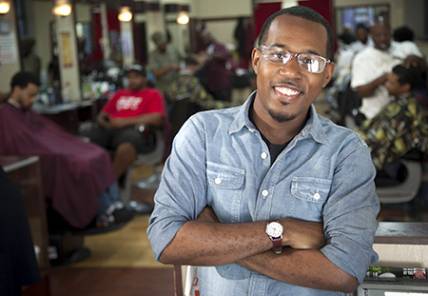NYU Wagner Alumnus Gives Black Boys, and Barbershops, Access to Fun-to-Read Books
Seeing that many African American boys lack relevant male reading role models as well as access to fun books, NYU Wagner alumnus Alvin Irby created an innovative way to promote early literacy in a place many boys frequent—the barbershop.
The community-based initiative, Barbershop Books, is now a widely acclaimed social enterprise, as well as a work in progress. Based in New York, the program creates child-friendly reading spaces in local barbershops for boys ages 4 to 8, drawing on the cultural significance of barbershops in black communities. It connects reading to a male-centered space, and it associates men to boys’ early reading experiences. It also increases boys’ access to culturally relevant, age-appropriate, and gender-responsive books – titles that young boys of color love to read.
“People ask me, ‘Why are black boys not reading enough?’” said Irby, who received his Master’s in Public Administration (MPA) at NYU Wagner in 2015. “I ask them, ‘What social cues are really present that would lead black boys to conclude that reading is something they should do?’”
Barbershop Books has joined with 40 barbershops in 11 cities across the United States. Deploying many enjoyable books from Scholastic and a colorful bookshelf from Kidkraft, Irby said his nonprofit plans to add 110 more sites by September 2017.

Irby’s eclectic professional and personal journey has put him in front of audiences of all ages. He has taught first grade and kindergarten in NYC public schools, served as Education Director at the Boys Club of New York in East Harlem, received accolades as a standup comedian, and spoken at national education conferences. Most recently, he has written a debut children’s book, Gross Greg.
While attending NYU Wagner, Irby launched Barbershop Books. He sought courses in nonprofit management and other topics relevant to his idea, and when he presented the project with fellow Wagner students at the Fels national public policy challenge, it won top honors.
“As a teacher, I taught tons of children to read, but more than 80 percent of black boys nationally are not proficient in reading,” he said. “Many people have analyzed the problem. I have an idea of how to do something about it.”